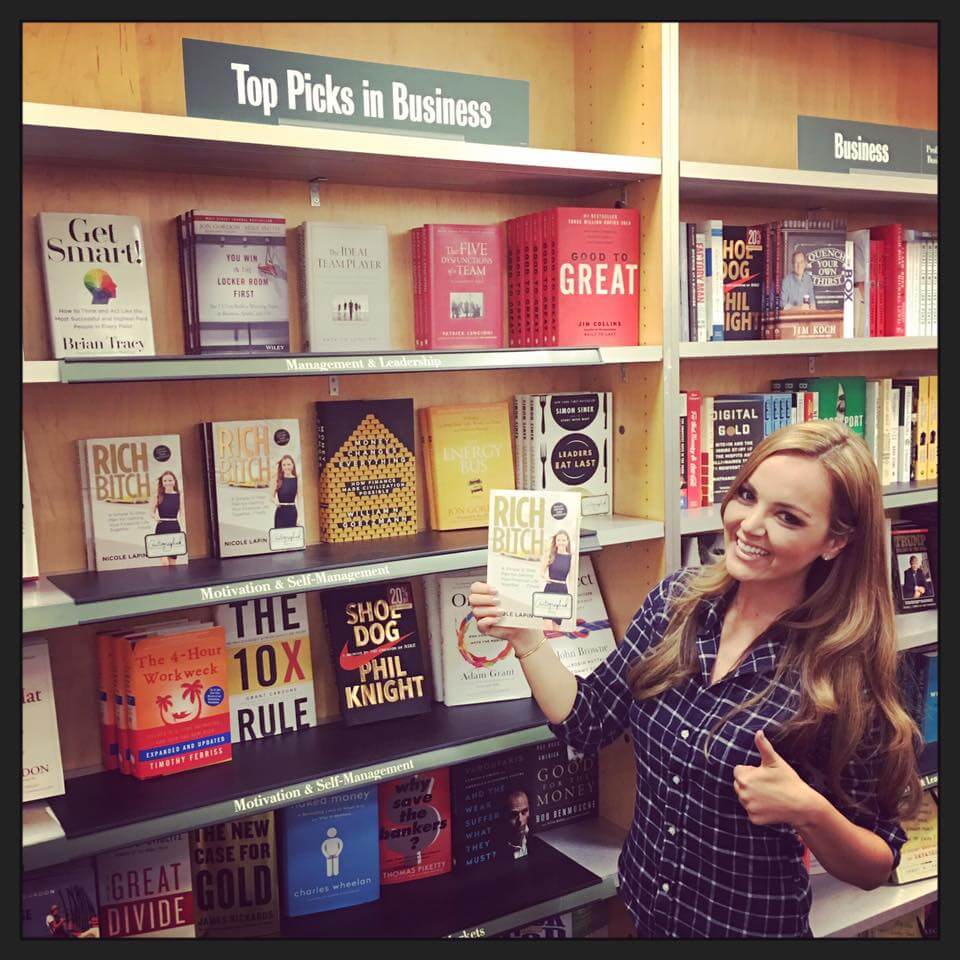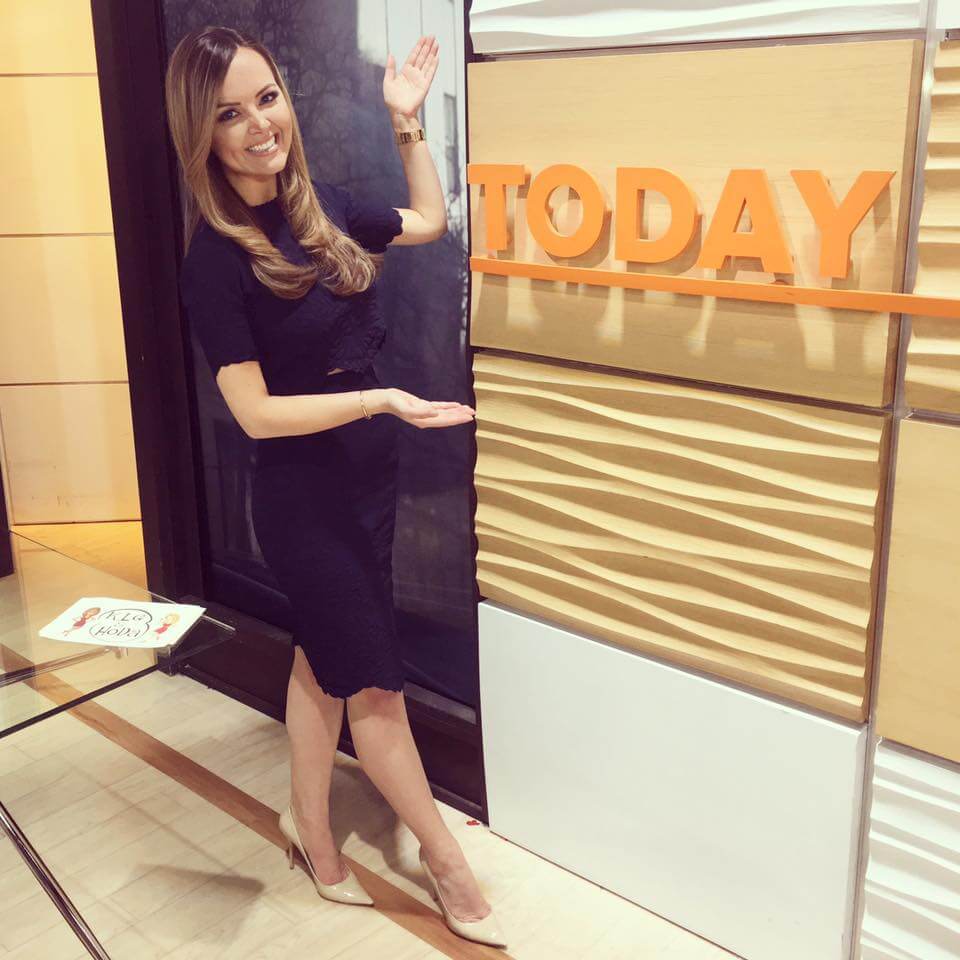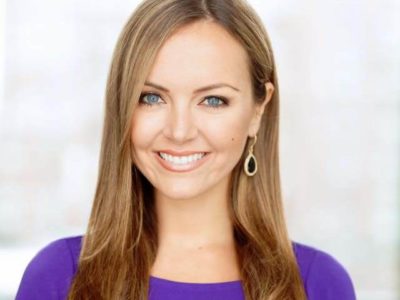Growing up in an immigrant family, a first-generation American, Nicole Lapin was not taught about money. She learned on the fly as a business reporter, eventually picking up and promoting the language of finance. Though she started as a broadcaster, she became an entrepreneur, author and self-made woman through her talent and determination to support other women through her book Rich Bitch. Her follow up to the surprise best-seller will be coming out this month.
College Magazine: At College Magazine we’re the guide for the undergraduate experience. How do you feel your time at Northwestern helped prepare you for your career?
Nicole Lapin: Northwestern was a great environment to help me create an ad hoc education for myself. I came in with a lot of credits—I actually went to high school on a college campus, Cal State-LA, so I came in with AP credits and also college classes. I took a bunch of summer classes—I did one at Harvard when I was in high school. So I came in with a ton there, and then they allowed me to take some time off to go work professionally in the broadcast world so I could gain the experience that I needed to work my way up really quickly. That was probably the most helpful thing I could do. In the broadcast world you need to have real life experience, not just from the textbook. They were really accommodating to that.
CM: Where did you get started with your broadcast career? What was your first job?
NL: My first on-air job was in Lexington, Kentucky at the CBS station, then I went to Sioux Falls, South Dakota at the CBS stations and then I got a job as a business reporter when I was 18 on the floor of the Chicago Merc, which is where my love affair for this whole thing started.
CM: You had transition from broadcasting into business, so what did that look like?
NL: I was working another big market job. In the broadcast world, you sort of work your way up in any sort of media. I had no connections. I grew up in an immigrant family, first-generation American, pretty broken home, needed to start working early on. I just wanted to get ahead pretty quickly. So in any sort of journalism you sort of start in small markets, make your mistakes, go up and up. I interviewed a broadcasting company that had a station in Milwaukee and I really—I went to the station group looking for a job in Milwaukee and they said they don’t have a job in Milwaukee, but they have a job on the floor of the Chicago Merc if I knew anything about business news. And I said I didn’t.
Obviously I grew up like, using cash as a lot of first generation American children do. My family didn’t have a Wall Street Journal on the kitchen counter, they didn’t talk about stocks or bonds or anything. So I was really clueless and then I faked it ‘til I made it and said I loved business news and I figured it out the hard way and what I realized is that money and business is a language.

It’s like anything else, we just don’t learn this stuff in school, we learn the Pythagorean Theorem, I’m not sure why we need that, but we don’t learn taxes, budgeting, business plans, all that stuff. So I figured out the language by learning it from the school of hard knocks, I didn’t get my M.B.A., I didn’t work at a bank, I just sort of figured it out the hard way and what I realized is that when I started learning the language I could then speak it to the world. And now, fast forward about a decade later, I’m now teaching other people how to speak the language.
CM: When did you start developing the idea for Boss Bitch? What did that journey look like when you started writing?
NL: So I left network. I started at CNN when I was 21 and I moved to CNBC when I was 25 and then by the time I was 27 I didn’t want to talk to rich white kids. I wanted to talk to my former self, the girl who was smiling and nodding, enjoying conversations about money because I was really clueless and confused. So I wanted to democratize financial content for an audience that needs it most, which is young women.
We’re coming up in the post-recession world as sort of this lost generation, looking for jobs, being over-qualified for jobs, not being able to join these money conversations because maybe they were taboo, maybe they didn’t understand, whatever the reason is. There wasn’t really the guide for that generation that could speak the new normal, talking not about being in a cubicle and having a 401K because doesn’t apply for everybody. I instead wanted to talk about people who were freelancing, who do not have a 401K, who could be starting their own business and I launched Rich Bitch as the first ever finance book that swears and also the first ever really that talks in plain English.
It was intended to reach a young woman who never would have imagined she’d pick up a money book otherwise but she picked it up because it was sassy and catchy and speaking in real English without jargon. That did really well, I didn’t know if it would. It hit the New York Times Best-Seller List right away, it sold out on Amazon, it became sort of this crazy thing.
And so two years later I’m launching the follow-up to that, which is Boss Bitch, a plan to take charge of your career and break it down into three sections and 12 sects. The first is being the boss of you. The second is being the boss of yourself within a bigger company, and the third is being the boss of your own business, and a lot of women in particular go through a lot of these stages in life.
A career well had, I believe, is not like a ladder, it’s like a rope swing. We may work for another company, we may start another business after that, we may be the CEO of our family, we may then go back to starting another business and whatever and any permutation of that, so I wanted to speak to that woman.
CM: Why do you think, especially now, it is important to work towards empowering women and making that a goal?
NL: You know, there was sort of not a voice for that audience, and I know exactly who my audience is—not all things to all people. If you try to be all things to all people, you’re nothing to no one. So I knew exactly who she was. Using the word bitch might be provocative to some people. In the younger generation, it’s used as a term of comradery. If you search on Instagram #MyBitches you’ll see a lot of best friends. It’s sort of taking back the word and owning it as a badge of honor.
I’ve been called a bitch in a derogatory sense, but there’s nothing wrong with being strong and powerful, being loud, making your voice heard. If that means I’m a bitch, then I’m a bitch and I’m owning it along with a lot of other strong, powerful women out there.
CM: What tangible advice would you have for college women who are looking to start their careers?
NL: It’s not your momma’s career trajectory. It’s not a ladder. It’s more entrepreneurial. Entrepreneurial is really a part of our zeitgeist. I’m on a show called Hatched which is on its second season. It’s similar to Shark Tank, we look at entrepreneurs all across the country. We’re seeing entrepreneurialism alive and well. The good news is that being an entrepreneur is easier now than ever before. The bad news is that it’s easier now than ever before. Anybody can do it.
We don’t have a road map and a guide book to do that. I’m meaning to help people understand just that and work on their side hustle, potentially when they’re in college, figuring out what they don’t want to do is just as important as figuring out what they do want to do. So try the things that you have in mind. If you hate them, be really honest with yourself and move on.
If you’re not making money in the first year of your business, you need to move on. A business is not a charity. You need to make money. Having a passion project is not a business, that’s not a career. Having a hobby is not having a job.
You need to figure out for yourself what your goals are in all aspects of your life, including family. Especially for young women, having a goal in the family life is just as important as having a goal in your financial and career life, they need to be compatible. You need to not neglect that part of your life and your goals.
I break that down into one, three, five, seven, ten year goals which I have in what I call the three F’s—family, finance and fun. If you’re not happy in one part of your life, you’re not happy in any part of your life. I think a lot of women wait too long to figure out if they want to have a family and kids and that becomes too late. I froze my eggs last year. I wanted to take control of my life. I encourage all women to take that into consideration, put your eggs on ice as an insurance policy, you never know what’s going to happen.
CM: What have been some of the most rewarding moments of your career?
NL: My goal when I went to CNBC was to create a multimedia production company that created successful financial content across all media, so having successful books was one goal of mine. Having a column in a major magazine was another, which ended up being one of the hard types of the mosaic. I’m the first ever money columnist to write a book.
You know a lot of major magazines didn’t feel like they needed money news for women and that they wanted to talk more about makeup, beauty, all of that stuff. I tried to prove that I wanted a seat—not only a seat at the table but a voice at the table and we all love makeup, we all love all of those things, but money should be part of that conversation.

Additionally I wanted to incubate into a talk show like Suze Orman sort of did in Oprah. I’ve been on The Wendy Williams Show for the last three seasons, along with Dr. Oz, Good Morning America and a lot of other talk shows as a financial expert reaching a mainstream audience. I wouldn’t be working in money news otherwise.
I’ve also created my own show. That was another goal of mine. It is called Hatched and it reaches the educational, informational block on Saturday morning. So it reaches a mainstream audience of families and children to teach them about business and finance.
CM: Can you speak a little bit about your experience with Hatched? How did that come about?
NL: I created that show as, you know it takes a really long time to create—development and television, it’s a really tough business. Most shows fail, or even fail to get off the ground. I just kept at it. It was probably the 60th show that I pitched. It’s a numbers game, so that ended up being at the right time. What we do is, unlike Shark Tank, they’re all consumer products. We test the products in retail before making a final decision. We realize that consumers our king, which is the adage. So we let the consumers decide if they like it or not.
CM: What was it like when you started achieving your goals and reaching mainstream success?
NL: In life I think it’s better to have low expectations. You know, I celebrate the small victories but I always come up with new goals. I never think that I am successful. I think when you start thinking and believing your own hype and your own bullshit, you end up getting lackadaisical and you end up just feeling an inertia instead of propelling forward. So I never thought I was actually successful. I always worked like I had my first job, making minimum wage, $20,000 a year. And I certainly don’t make that today, but I’m just as happy as when I started my career.




















